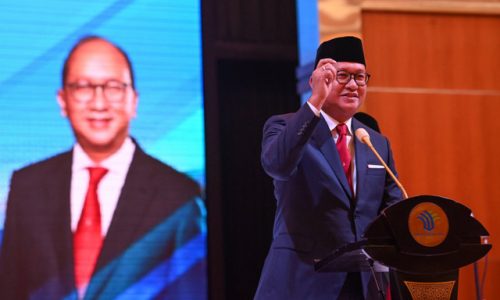Jakarta – A survey by Japan External Trade Organization (JETRO) has revealed that about half of Japanese companies operating in Indonesia are aiming for expanding their businesses following positive business trend in the last few years.
The survey results of JETRO were presented by JETRO President Director Masakazu Takahashi before Presidential Chief of Staff General (ret.) Moeldoko and Palace officials at Bina Graha building in Jakarta on Wednesday, March 20, 2024.
The survey reveals that 71.4 percent of Japanese-affiliated companies in Indonesia are expected to be “profitable” in terms of operating income in 2023. This is the highest figure compared to their performance in other ASEAN countries.
Takahashi cited that 42.1 percent of the surveyed companies have expressed confidence that their operating profit in 2023 will increase from the 2022 figures.
“All of these is supported by an increase in demand in the Indonesian domestic market,” he said.
Takahashi also revealed that 49.5 percent of Japanese companies operating in Indonesia are interested in expanding their businesses here. Expectations for domestic market demand expansion in Indonesia are higher than in ASEAN as a whole.
Japanese companies in Indonesia, Takahashi continued, are looking at various advantages of doing business in Indonesia. These include market size and growth potential, low wage costs, ease of recruitment of local staff, and the stability of the political and social situation in the country.
Takahashi, however, also cited some of the risks faced by Japanese companies doing business in Indonesia. These include rising labor costs, unclear government management policies, and time-consuming tax procedures.
“We hope that the Indonesian government can communicate more intensely (with Japanese companies in Indonesia) during the regulation-making process. As for taxation, we really appreciate the transparency of the Supreme Court in handling tax cases,” he said.
In his remarks, Moeldoko praised Japanese companies’ presence in Indonesia, including their intrest in expanding their business, as evidence that the Indonesia economy is still resilient.
“The policy of President Joko Widodo is to always welcome and accommodate [foreign] investment, by among others implementing regulatory simplification. This is done in an effort to provide ease of doing business in Indonesia,” Moeldoko said.
Regarding the various inputs submitted by Japanese business people in Indonesia, Moeldoko said that the survey results will be used as evaluation material in the future for the government in strengthening the economy and investment. “We will make this a memo to the relevant ministries,” Moeldoko concluded.









